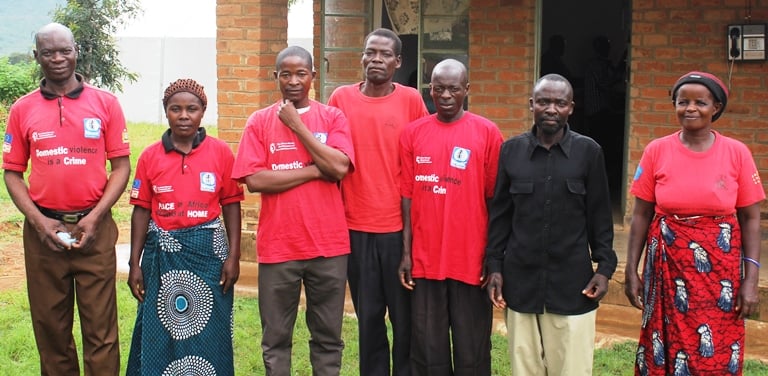Kisa Kaisi is a 16 year old girl. She is in standard eight at Ilengo Primary school in Kameme, Chitipa District. Born in a family of six children of three females and three boys, she is the last born. At 13 years, while in standard seven, she dropped out of school because of pregnancy and gave birth to a baby girl named Lucy. A year later, in 2014 she got married to the man who made her pregnant, Samuel Mwapashi. For two years, they stayed together and sadly, she also became a victim of gender based violence. The family was also failing to provide for itself, they struggled to make ends meet until she decided to leave and go to her parents’ house.
While at her parent’s house, the mother groups within the Kameme GEWE network of volunteers approached and requested her to go back to school because they saw she was still young and had potential to still realize a better future. She accepted and enrolled back to school and is in standard eight now. “I want to tell other girls not to be cheated, I experienced a lot of problems when I got married and they should not fall in this situation just like I was” she said as she narrated her story.
The Kameme GEWE network of volunteers that comprises both men and women has been working together with local leaders on reducing incidences of child marriages and also encouraging girls to stay in school. The network also identifies young girls that dropped out of school due to early marriages or pregnancy and are encouraged to go back to school. The explain that most of the girls that are married early suffer a lot of abuses in their marriages including economic abuse since they are either married by young people that have nothing to support the family or are either they are the second or third wife.
“ since we started our work, we have managed to rescue 39 from early marriages, withdrawn 20 girls from marriages and 123 girls back to school; this community has been very supporting in informing us if there is any incident of child marriage or deliberate girl drop out” says chairperson of Kameme GEWE network of volunteers.
Kisa is an example of a girl who has been rescued from marriage and brought back to school. “I want to be a nurse when I finish school and I want to be an example to other young girls. I am doing well in school as well based on the recent results” she says. The network has been so vigilant in this work such that while some girls that have been brought back to school are continuing with their education, six other girls have passed the final secondary school education and two girls qualify for professional courses.

Established in 2013, among other activities, the Kameme GEWE network of volunteers is also involved in reducing cases of child trafficking and defilement and also reporting such cases to police. More than 50 girls have been rescued and withdrawn from marriages while also they referred 12 cases of defilement and rape to the police.
GEWE in Malawi
Since 2012, the European Union and the United Nations Population Fund have been supporting the Ministry of Gender, Children, Disability and Social Welfare to coordinate the implementation of the GEWE Programme. The programme aims to support Government’s commitment to reduce gender inequalities between men, women, girls and youths in accessing productive resources and development opportunities, as well as promoting decision making in order to contribute positively to the Malawi Growth and Development Strategy II and accelerate attainment of Millennium Development Goals and now
Child marriages
Girls in Malawi have been and continue to face a myriad of interrelated challenges - social, economic, protective, and health - which inhibit their access to education. Data from the NSO in 2012 revealed that 58% of girls drop out of school and out of those remaining in school, 18% became pregnant and 8% get married. Less than 25% of girls ever finish primary school. The low retention rate is largely attributed to harmful cultural practices, lack of age- appropriate reproductive health information and knowledge, self- efficacy and utilization of services which, if made available, could assist in reduction of drop out through pregnancy prevention as well as reduction in HIV/STI transmission. Roughly 50% of all girls are married by age 18 in Malawi and 25% of all adolescent girls already have a child.


